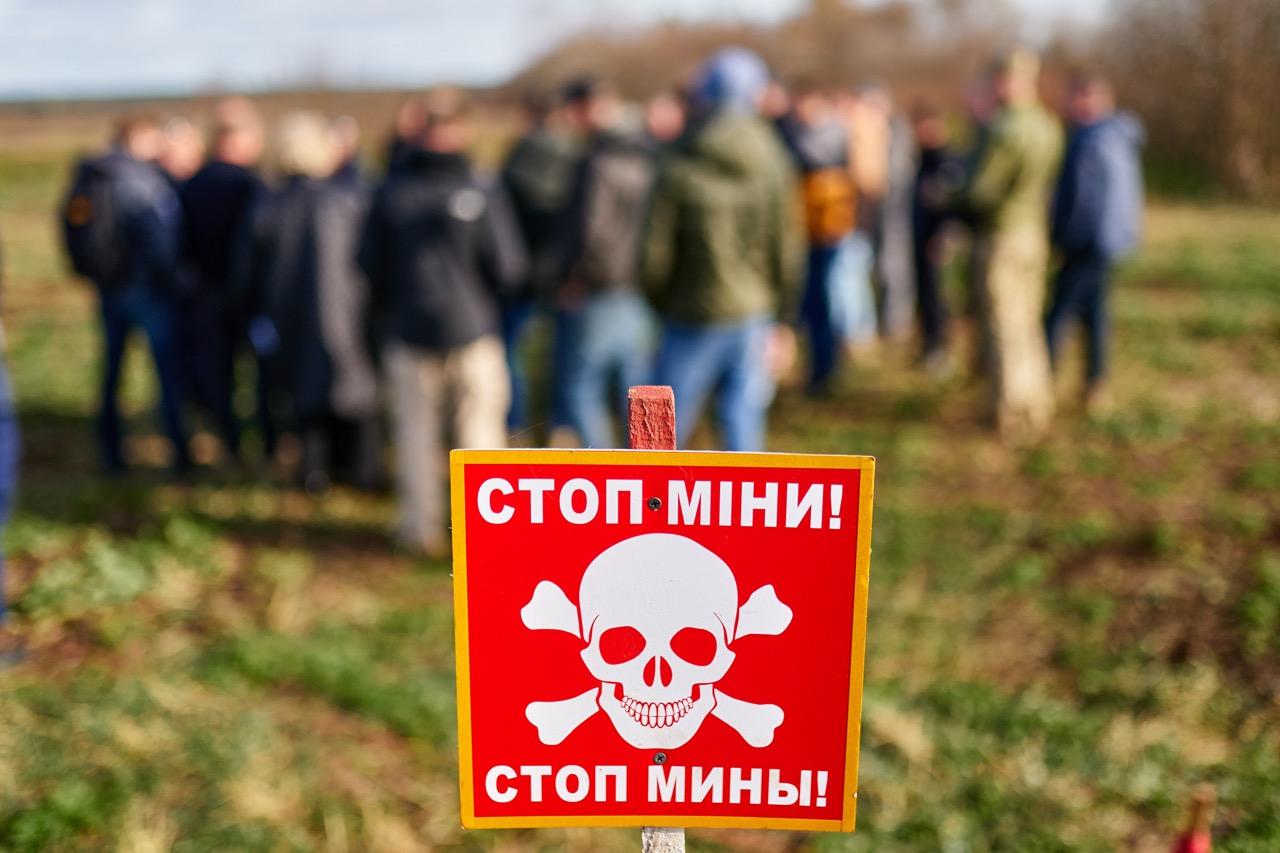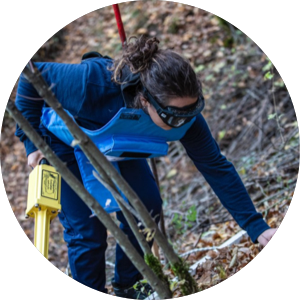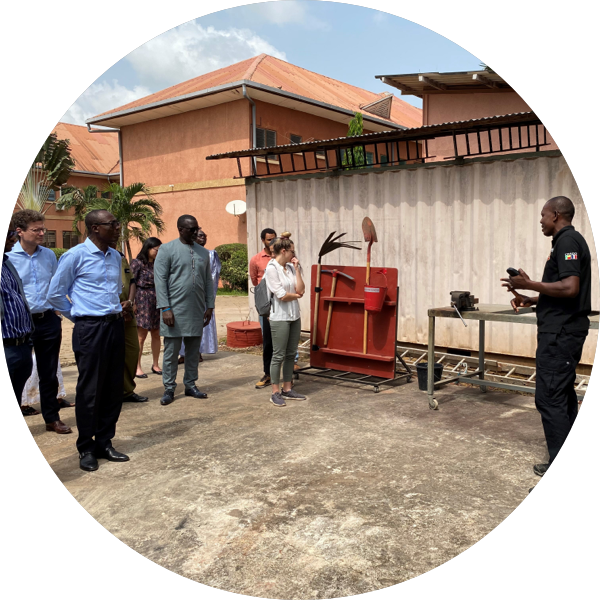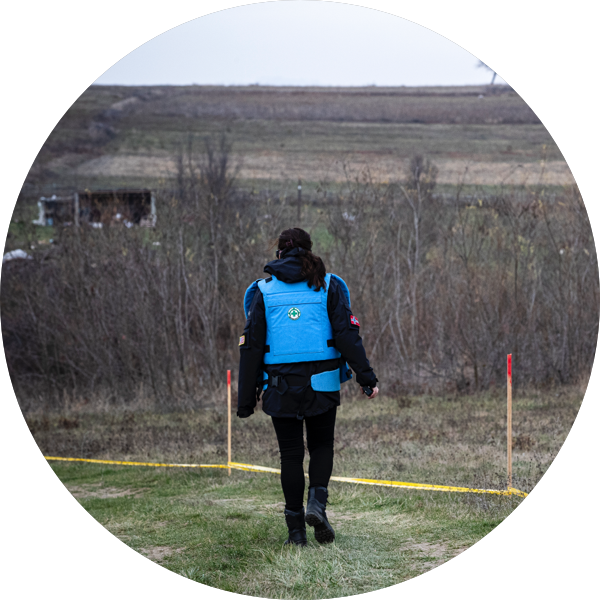01
Foreword
For the past 25 years, the GICHD has worked towards reducing risks to communities caused by explosive ordnance. We are helping to develop and professionalise mine action and ammunition management for the benefit of our partners at global, regional, and national levels. Armed conflicts are surging globally and civilian populations represent 90% of the victims. Thus, the core mandate of the GICHD is more important than ever: saving lives and restoring safety to communities affected by explosive ordnance.
Read more
In 2022, the GICHD supported 54 countries and territories; contributions from 25 donors supported our commitment. The Centre adapted to the post-pandemic reality and increased the provision of remote support to complement its more traditional modes of intervention. While at times challenging, these adaptations further solidify the Centre’s impact in allowing work in areas difficult to assess and thus strengthening our overall outreach.
Strengthening our partners’ knowledge and skills is one of our fundamental commitments. Our objective is to empower countries and territories to address both new and legacy contamination efficiently and effectively, thus creating safety for affected communities. Supporting national partners towards the fulfilment of convention obligations and completion targets remains the priority for the Centre. Thereby, the Centre constantly deepens collaboration with different humanitarian, development, and peace actors to support sustainable livelihoods.
Our approach is needs-driven and our support builds on detailed assessments, ensuring high quality responses to specific challenges. Moreover, the GICHD invests significant resources in research and development, generating knowledge, good practice guidelines and tools for effective and efficient actions on the ground.
At the global level, the GICHD continues to support the implementation of international humanitarian law conventions through expert input and by helping to develop globally accepted standards in both mine action and ammunition management. Furthermore, the GICHD promotes dialogue and cooperation at the regional level through its cooperation programmes, which allow a dissemination of good practice, key tools and resources and their adaptation to specific regional realities.
Mine action is a collective effort; our achievements depend on the support of our donors and the expertise and commitment of our co-workers and partners, whom we thank wholeheartedly. A world in which societies can thrive free from explosive ordnance is possible and remains our goal.
Dr Barbara Haering
GICHD President
Ambassador Stefano Toscano
GICHD Director

Dr Barbara Haering
President of the Council of Foundation

Ambassador Stefano Toscano
GICHD Director
02
Results at a glance
Red: Field Support
Grey: Global Framework
1. National strategies are developed, adopted and implemented by states, according to good practice
National strategies are developed, adopted and implemented by states, according to good practice
- 2 strategy assessments completed
- Kosovo, Sri Lanka
- 2 national strategies developed in line with good practice
- Italy, Sri Lanka
- 2 strategies revised
- Kosovo, Zimbabwe
- 4 strategies implemented with the support of the GICHD
- Germany, Iraq, Kosovo, Zimbabwe
- 2 national strategies integrated GD considerations
- Italy, Sri Lanka
2. National standards are developed, adopted and implemented by states, according to international standards

National standards are developed, adopted and implemented by states, according to international standards
- 3 NMAS needs assessments completed
- Armenia, Guinea-Bissau, Mauritania
- 3 NMAS reviewed and updated
- Angola, Cambodia, Vietnam
- 3 workshops conducted, attended by 125 people (107 men and 18 women)
- Angola (NMAS review)
- Cambodia (NMAS review)
- South-East Asia region (RCM)
3. States and other partners use quality information to support their programming and operational management

States and other partners use quality information to support their programming and operational management
- 7 IM assessments conducted
- Bosnia and Herzegovina, Cambodia, Lebanon, Libya, Somalia, Sudan, Yemen
- 2 States improved their IM capacity score
- Bosnia and Herzegovina, Lebanon
- 26 States / partners adopted IMSMA Core
- 11 national mine action centres adopting IMSMA Core
- Afghanistan, Azerbaijan, Cambodia, Colombia, Lebanon, Libya, Solomon Islands, Tajikistan, Ukraine, Yemen
- 15 UNMAS programmes using IMSMA tools
- Abyei, Afghanistan, Central African Republic, Colombia, Cyprus, Democratic Republic of the Congo, Iraq, Mali, Nigeria, Palestine, Somalia, South Sudan, Syrian Arab Republic, Western Sahara and UNMAS headquarters
- 1 partner adopted IMSMA Core
- Mayday Rescue Foundation for the Syrian Arab Republic
- 11 national mine action centres adopting IMSMA Core
- 3 States / partners incorporated humanitarian datasets into their IM systems
- Ukraine, UNMAS, Yemen
4. Land release is implemented by states and other partners, according to good practice

Land release is implemented by states and other partners, according to good practice
- 1 baseline assessment completed
- Yemen
- 1 scoping mission completed
- Ukraine
- 3 tools developed and implemented
- MACRA, CORD, Equipment e-Catalogue
- 2 publications / studies published
- Editions 1 and 2 of the Explosive Ordnance Guide for Ukraine
- 3 publications / studies developed
- Operational Efficiency in Mine Action
- Guide to Ageing of Explosive Ordnance in the Environment
- Difficult Terrain in Mine Action
- 9 training courses delivered, attended by 194 people (154 men and 40 women)
- 1 global course for operations managers in Switzerland
- 3 QM courses, in the Balkans, Turkey and Ukraine
- 3 courses on non-TS, in Ukraine, Yemen and a global course in Switzerland
- 2 courses on TS, in Bosnia and Herzegovina and Turkey
5. Regional cooperation furthers the exchange, dissemination, and adoption of good practice

Regional cooperation furthers the exchange, dissemination and adoption of good practice
- 20 NMAAs / mine action programmes exchanged good practice
- Benin (CPADD), Burkina Faso, Central African Republic, Chad, Democratic Republic of the Congo, Egypt, Guinea-Bissau, Iraq, Jordan, Lebanon, Libya, Mali, Mauritania, Niger, Palestine, Senegal, Somalia, Sudan, Syrian Arab Republic, Yemen
- 4 NMAAs / mine action programmes adopted good practice
- Iraq, Lebanon, Somalia, Yemen
- 17 mine action resources / chapters of the IMAS translated into local languages
- 5 into Arabic, 12 into French
6. Risks from explosive ordnance are reduced in a gender and diversity sensitive and responsive manner

Risks from explosive ordnance are reduced in a gender and diversity sensitive and responsive manner
- 3 countries’ GD assessments completed
- Armenia, Cambodia, Yemen
- 4 countries / partners equipped with GD capacity
- Halo Trust Iraq, International Demining and Explosive Ordnance Disposal Company Jordan, MAG Lebanon, NPA Vietnam
- 22 countries / partners adopted methods, tools or approaches developed, promoted or shared by the EORE Advisory Group and the GICHD
- ARMAC, Burundi Civil Defense and Disaster Management, DCA, DRC/DDG, Executive Secretariat for the Demining and Development of the Northwest Coast in Egypt, Free Fields Foundation (3F), HALO Trust, Haut Commissariat National de Déminage (HCND), HI, ICRC, LMAC, MAG, National Humanitarian Mine Action Committee Nigeria, Palestinian Mine Action Center (PMAC), Senegalese National Mine Action Centre / Centre National d'Action Antimines au Sénégal (CNAMS), SPADO, Sudan National Mine Action Center, UNHCR, University of Balamand, UNMAS and YEMAC
- 2 policy documents / strategies / plans / agendas promoting EORE produced
- DCA global results framework, mine action / EORE module for the UNHCR Humanitarian Protection in Armed Conflict toolkit
- 3 publications on GD produced
- 8 training courses and workshops conducted,attended by 1,213 people.
- 5 GDEI events: workshop to share the ARMAC study, Arab RCP GFP community of practice workshop, online GFP course, inclusive leadership course in Iraq, workshop for HI
- 3 EORE workshops: ARCP, FRCP, PfP digital workshop
7. Ammunition is managed by states according to good practice

Ammunition is managed by states according to good practice
- 6 baseline assessments on SSMA completed
- Albania, El Salvador, Guatemala, North Macedonia, Peru
- 20 States / territories / partners assisted in improving their SSMA in line with good practice
- 10 States / territories: Albania, El Salvador, Georgia, Guatemala, Kosovo, Moldova, North Macedonia, Peru, United States of America, Zambia
- 10 partners: EU, Golden West Humanitarian Foundation, HALO Trust, ITF, RECSA, SEESAC, Swiss Federal Department of Defence, Civil Protection and Sport, UNIDIR, UN SaferGuard programme, United States European Command
- 4 States made ammunition stocks safer and more secure in line with good practice in the IATG
- El Salvador, Guatemala, Moldova, Peru
- 6 candidates added to the roster of ammunition management experts following the 2022 UN SaferGuard expert validation exercise for the Middle East and North Africa region
- 5 tools developed
- A-MAP, AAMVS (self-assessment tool), digitalisation of the IATG using a beta version, IATG training package, standardised assessment methodology
- 9 publications / working papers developed
- 2 informal dialogue working papers
- Contributed to Explosive Ordnance Guide for Ukraine (see page 6)
- Framing document for the NATO Building Integrity handbook
- ‘The Bata Explosions: Lessons Learned’ in Counter-IED Report, Winter 2021 / 22
- AAMVS Phase II final report (to be published)
8. Implementation of Conventions is fostered through the provision of expertise and logistical support
Implementation of Conventions is fostered through the provision of expertise and logistical support
- 7 extension requests reflecting GICHD input submitted under the APMBC (Serbia, Sudan, Thailand, Yemen) and the CCM (Bosnia and Herzegovina, Chad, Chile)
- 3 States supported in APMBC implementation using a country-focused and individualised approach
- Chad, Cambodia, South Sudan
- 60 references to GICHD substantive (44) and logistical (16) support in statements or other types of intervention by 35 States / partners
- Australia, Austria, Belgium, Bosnia and Herzegovina, Canada, Chad, Chile, Colombia, Ethiopia, Germany, GuineaBissau, Guyana, Haiti, Iraq, Ireland, Italy, Jordan, Lebanon, Netherlands (Kingdom of the), Norway, Serbia, Sri Lanka, Spain, Somalia, Sudan, Sweden, Switzerland, Tajikistan, Turkey, Uganda, Ukraine, United Kingdom of Great Britain and Northern Ireland, Yemen, Zimbabwe, APMBC ISU
9. Relevant concepts, methods and tools are captured in international standards
Relevant concepts, methods and tools are captured in international standards
- 3 new IMAS standards and T&EPs submitted for consideration and approved by the IMAS Review Board
- IMAS 07.50 on the Management of Human Remains in Mine Action
- T&EP 07.31/01/2022 on the Setting of Animal Detection Systems Testing Sites
- T&EP 07.31/02/2022 on the Competencies Required for Animal Detection System Handlers, Team Leaders and Instructors
- 12 IMAS standards / TNMAs / T&EPs revised
- IMAS 05.10; IMAS 06.10; IMAS 07.50; IMAS 08.40; IMAS 9.30; IMAS 10.30; IMAS 13.10
- TNMA 12.10/01
- T&EP 07.31/01/2022; T&EP 07.31.02.2022; T&EP 09.30/01/2022; T&EP 09.31/01/2019
- 3 IMAS training courses and outreach workshops conducted attended by 53 people (44 men and 9 women)
- 1 Global workshop on ARE in Switzerland
- 1 PfP IMAS and conformance course
- 1 Workshop in Mauritania
- 890 people (657 men and 233 women) completed the introductory online IMAS e-learning course
10. International normative and policy processes are informed by evidence
International normative and policy processes are informed by evidence
- 7 statements / presentations delivered in contribution to international normative and policy processes
- 2 statements and 1 presentation at the second substantive session of the OEWG on Conventional Ammunition
- 2 presentations at Wilton Park meetings
- 2 presentations in plenaries of the 25th NDM-UN
- 5 plenary sessions / side events organized in contribution to international normative and policy processes
- 1 at the Eighth Biennial Meeting of States of the UN Programme of Action on Small Arms and Light Weapons
- 1 at the Eighth Conference of States Parties to the ATT
- 1 plenary session on IM at the 25th NDM-UN
- 2 side events on MACRA and IMAS at the 25th NDM-UN
11. The reduction of risks from explosive ordnance contributes to humanitarian action and sustainable development
The reduction of risks from explosive ordnance contributes to humanitarian action and sustainable development
- 3 SDG-aligned national strategies / standards / policies developed
- Iraq, Italy, Sri Lanka
- 3 publications linking mine action and broader agendas produced
- Bosnia and Herzegovina, Cambodia, Colombia
- 16 events / presentations attended / given linking EORE with gender equality, humanitarian action, peace, security and development
- 9 presentations (Cambodia High-level Dialogue on Mine Action, GCSP Trainee Diplomats course, GICHD global workshop on all reasonable effort, Northeastern University, 88th PfP course for mine action operations managers, Sciences Po, University of Geneva, UNMAS Mine Action Symposium, WIT Virtual Voices)
- 1 event (including presentation) contributing to the National Stakeholder Dialogue on mine action (Colombia)
- 1 training course in Bosnia and Herzegovina
- 1 workshop presenting preliminary findings in Somalia
- 1 panel discussion (side event at the 25th NDM-UN meeting)
- 3 case study launch events: Bosnia and Herzegovina (44 participants; 24 men and 20 women) / Cambodia (66 participants; 51 men and 15 women) / Colombia (87 participants; 41 men and 46 women)
03
A focus on
Ukraine was one of the countries most affected by explosive ordnance (EO) in the world even prior to the current conflict, with the highest casualty rate in Europe in 2021. Pre-2022 casualties stemmed from legacy contamination and contamination caused by the conflict in Donbas in 2014–15. One year after the escalation of the conflict, ongoing hostilities have resulted in further heavy contamination in many parts of the country.
Read more
The GICHD has been working with the authorities in Ukraine to increase national-level capacity since 2012, making it well placed to intensify support after the escalation of the conflict.
Soon after the escalation of the conflict, and following a rapid assessment, the GICHD engaged in a series of initiatives: in the field of information management, the GICHD focused its efforts on enhancing and maintaining the Information Management System for Mine Action (IMSMA), which continued with almost no interruption due to the conflict. IMSMA, the GICHD’s flagship platform, is a technical solution to aggregate, interpret, and share data across partners and sources, mapping areas where explosive ordnance is identified, which builds the foundation for effective and efficient demining operations. The GICHD also developed an Explosive Ordnance Guide for Ukraine with two editions produced in 2022, which outlines more than 170 types of mines and explosive ordnance found in Ukraine, serving as a practical reference for humanitarian teams working on the ground to identify items they find, especially when online sources are difficult to access. Both editions are available in Ukrainian and English.
With the ongoing hostilities, increased explosive ordnance contamination is posing a threat to civilians’ lives and livelihoods, highlighting the critical importance of explosive ordnance risk education (EORE). Working via the EORE Advisory Group including experts from the Geneva International Centre for Humanitarian Demining (GICHD), UN agencies, international organisations and NGOs, the GICHD helped develop and translate a Ukraine-focused EORE Q&A Fact Sheet. The factsheet, published in March 2022, provides guidance on EORE for organisations responding to the crisis in Ukraine.
In consultation with national authorities, the GICHD amended its approach to technical training, ensuring that all thematic courses were delivered on-site in Ukraine, tailored to the context. Towards the end of the year, the GICHD conducted bespoke training courses in quality management and non-technical survey.
In November 2022, the GICHD facilitated a Ukraine mine action donor coordination workshop in Geneva. The event, opened by the Ukrainian Minister of Defence and Chair of the National Mine Action Authority (NMAA), was attended by 76 representatives from the Ukrainian authorities, and donor and partner organisations. The Deputy Minister of Internal Affairs was in attendance, as well as high-level representatives from the Ministry of Defence, State Emergency Services and Ministry for Reintegration. The workshop was an incubator for practical solutions, action points and next steps towards addressing key operational challenges in a cooperative manner and based on local needs. It explored new avenues to implement mine action coordination efforts to, eventually, serve as a catalyst to positively impact the lives of Ukrainian communities. The results included an agreed series of operational actions which are being monitored by the GICHD.
The GICHD reaffirms its commitment to working alongside national authorities and the international mine action community in Ukraine – taking urgent action to save lives today and setting the stage for reconstruction and sustainable development in the longer term.

04
Beneficiary countries and territories
In 2022, the GICHD supported national authorities, international and regional organisations, and operators in 54 countries and territories.
The GICHD adapted to the post-pandemic reality by reinforcing its remote support, reaching isolated or otherwise inaccessible areas, and strengthening overall outreach. However, when in-person contact was deemed essential and destinations were accessible, GICHD staff travelled to provide on-site support, liaise with partners and donors, and organise workshops and training courses.
| Title | Latitude | Longitude | Description |
|---|---|---|---|
| Afghanistan | 34.52982871 | 69.17238745 |
|
| Albania | 41.327545 | 19.818699 |
|
| Angola | -12.28601411 | 17.67407767 |
|
| Armenia | 40.18294407 | 44.51733362 |
|
| Azerbaijan | 40.36590966 | 48.06707879 |
|
| Benin | 9.668767798 | 2.426891184 |
|
| Bosnia and Herzegovina | 44.58778453 | 17.74539415 |
|
| Burkina Faso | 12.46351616 | -1.755471132 |
|
| Cambodia | 12.81514143 | 105.1059361 |
|
| Central African Republic | 6.643944723 | 20.61330472 |
|
| Chad | 12.112180 | 15.068970 |
|
| Chile | -33.448891 | -70.669266 |
|
| Croatia | 45.09566453 | 14.88860369 |
|
| Colombia | 3.798903704 | -73.14739741 |
|
| Cyprus | 35.04842395 | 33.23828739 |
|
| Democratic Republic of Congo | -4.441931 | 15.266293 |
|
| Ecuador | -1.44239 | -78.59905 |
|
| Egypt | 30.0443879 | 31.2357257 |
|
| El Salvador | 13.6989939 | -89.1914249 |
|
| Georgia | 42.18432796 | 43.48560558 |
|
| Germany | 51.11751548 | 10.29693198 |
|
| Guatemala | 14.6222328 | -90.5185188 |
|
| Guinea Bissau | 11.861324 | -15.583055 |
|
| Iraq | 33.15856911 | 43.02322926 |
|
| Italy | 41.8933203 | 12.4829321 |
|
| Jordan | 31.34487257 | 36.74655209 |
|
| Kosovo | 42.65107936 | 20.86850807 |
|
| Lebanon | 34.11129845 | 35.87966087 |
|
| Libya | 27.09487216 | 17.27397533 |
|
| Mali | 17.92133393 | -1.781481732 |
|
| Mauritania | 20.19842838 | -10.70085053 |
|
| Moldova | 47.0245117 | 28.8322923 |
|
| Niger | 17.58793708 | 9.318582737 |
|
| Nigeria | 9.721935924 | 7.93680348 |
|
| North Macedonia | 41.9961816 | 21.4319213 |
|
| Palestine | 31.51383496 | 34.47601896 |
|
| Peru | -12.0621065 | -77.0365256 |
|
| Senegal | 14.34059835 | -14.44295052 |
|
| Serbia | 44.14179294 | 20.97457225 |
|
| Solomon islands | -9.647921021 | 160.1316407 |
|
| Somalia | 2.864076392 | 45.25653142 |
|
| South Sudan | 7.599270543 | 30.20762455 |
|
| Sri Lanka | 7.579561453 | 80.93385864 |
|
| Sudan | 16.37336395 | 30.48233675 |
|
| Syrian Arab Republic | 35.01057063 | 38.5828885 |
|
| Tajikistan | 38.55376055 | 70.9933891 |
|
| Thailand | 15.42962598 | 101.3447021 |
|
| Turkey | 39.03564534 | 35.34638729 |
|
| Ukraine | 49.0286344 | 31.62897982 |
|
| Vietnam | 14.58134726 | 108.4015121 |
|
| Western Sahara | 24.71872496 | -13.17492442 |
|
| Yemen | 15.91626129 | 47.50427845 |
|
| Zambia | -15.4163395 | 28.2818414 |
|
| Zimbabwe | -18.95832542 | 30.2268197 |
|
06
Financial overview
All amounts in CHF

Operations
| Publications and outreach | 274,335 |
| Travel costs | 811,490 |
| Professional fees (events & consultants) | 3,483,866 |
| Travel costs for third parties | 316,800 |
Staff
| Personnel expenses | 12,021,164 |
General Services
| ICT and furniture maintenance | 0 |
| ICT and furniture acquisitions | 252,001 |
| ICT running costs | 252,498 |
| Office supplies | 23,571 |
Miscellaneous
| Miscellaneous expenses | 891,849 |
| In-kind expenditures | 540,170 |
TOTAL DIRECT EXPENSES: 18,867,744
Financial Results
| Financial results | (272,855) |
TOTAL EXPENDITURES: 18,594,889
Contributions
| Contributions received | 17,813,351 |
| Activities / contributions deferred to next year | (997,809) |
| Activities / contributions deferred from previous year | 1,239,177 |
TOTAL CONTRIBUTIONS FOR THE YEAR: 18,054,719
Other Income
| Miscellaneous income | 0 |
| In-kind contributions | 540,170 |
TOTAL REVENUES: 18,594,889
07
Donors
The GICHD is thankful to all contributors who make its work possible. In 2022, the Centre benefitted from core contributions, project funding and in-kind support from 25 governments and organisations.














In-kind contributions from Esri, and Information and Communication Technology (ICT) hosted by the GCSP.





